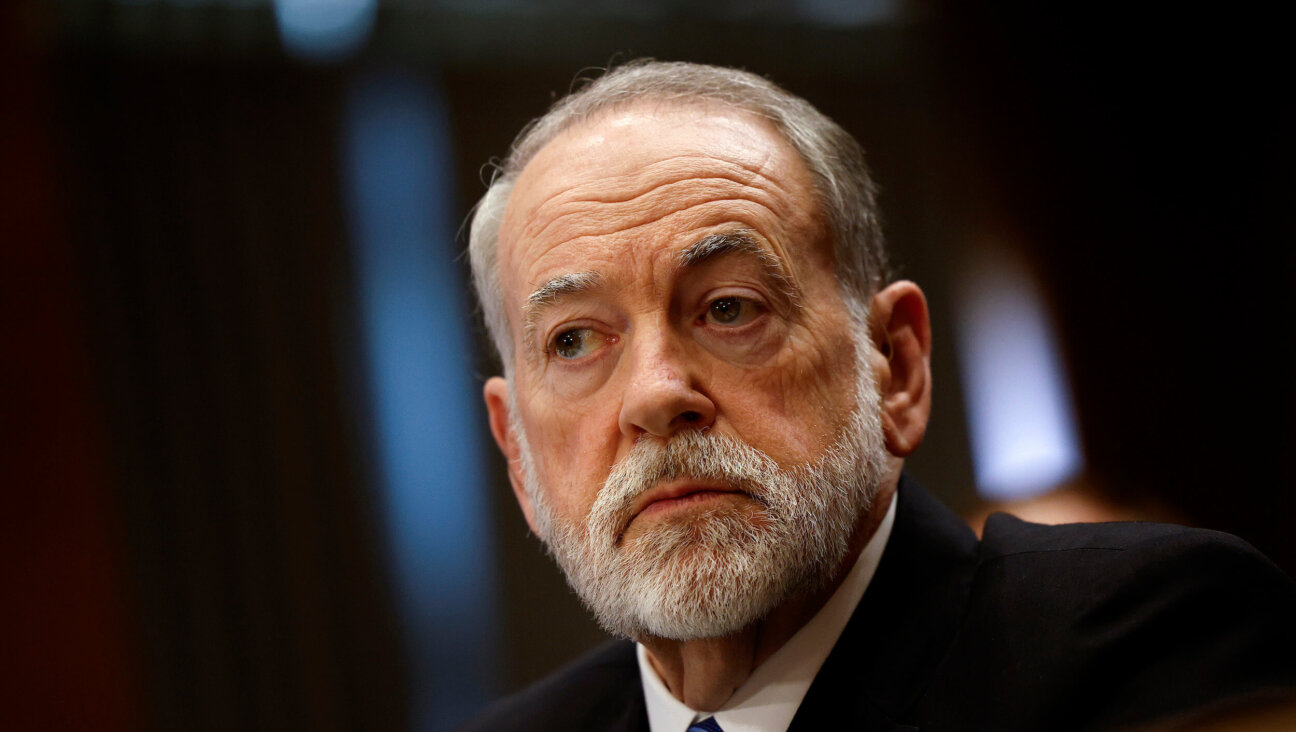Exclusive: Jewish voters prefer Cuomo, with Mamdani in second place for New York Mayor, new poll shows
Andrew Cuomo, Zohran Mamdani and Brad Lander compete for support as Jewish voters demand action on antisemitism

NYC mayoral candidates at a town hall for Jewish voters on May 22. Photo by Michael Priest Photography
Andrew Cuomo, Zohran Mamdani and Brad Lander are emerging as the top three choices for Jewish voters in the crowded race for New York City mayor, according to a new poll shared exclusively with the Forward. An overwhelming majority of voters also say the city must do a better job of protecting Jewish residents from hate crimes.
The Honan Strategy Group survey of 412 likely Jewish voters in the June 24 Democratic primary, conducted May 15 through May 18, shows Cuomo with 31% of support and Mamdani, a Democratic Socialist who supports boycotting Israel, with 20%. Lander, who is Jewish, is in third place with 18%. The other Jewish candidate, Scott Stringer, has 5%, behind Council Speaker Adrienne Adams with 8%.
The poll, conducted via text-to-web and commissioned for the non-partisan Jewish Voters Action Network, has a reported margin of error of plus or minus 2.9%. A recent Marist poll showed Cuomo with 26% support, Lander with 17% and Mamdani with 14% among Jewish voters.
Jewish voters account for at least 16% of the electorate in the primary and have historically proved to be a powerful and even decisive factor in mayoral elections. Mayor Eric Adams, who opted out of the primary to run on an independent line in the general election, won in 2021 with the help of Orthodox support; Orthodox voters typically vote in blocs based on rabbinic endorsements. The leading candidates have intensified their outreach to the community in recent weeks.
Mamdani, who co-founded the Students for Justice in Palestine group at Bowdoin College when he attended from 2010 to 2014, has come under scrutiny from both his hard-line anti-Israel base and pro-Israel groups for balancing his leftist views on the Israeli-Palestinian conflict with recognition of Israel’s right to exist. Nevertheless, he has seen his support grow among Jewish voters as he solidifies his status as an alternative to Cuomo in the ranked-choice voting system, introduced in 2021 to avoid run-off elections and allow voters to rank up to five candidates.
Zellnor Myrie, a state senator representing Crown Heights, a neighborhood with a significant Orthodox population, received 3% of support in the Honan poll, followed by Whitney Tilson, who is married to a Jewish woman, with 2%. Jessica Ramos, a progressive state senator from Queens, polled at 1%. Thirteen percent of Jewish voters are still undecided.
The poll shows Cuomo leading all likely voters with 43%, followed by Mamdani at 24%, among the 724 Democratic primary respondents. The results project Cuomo would beat Mamdani with 61% of the overall vote in the seventh round.
At a recent town hall with Jewish voters, co-hosted by the UJA Federation and the Jewish Community Relations Council of New York, Mamdani said that his social safety net policies, addressing poverty, elder care and public safety, will outweigh disagreements over Israel in a city with the largest bloc of Jewish voters outside of Israel.
“What I strive to show is that it’s a disagreement still based on a shared sense of humanity, not a disagreement that is based on the bigotry that is often characterized of these positions,” Mamdani said.
Cuomo, the frontrunner, has made Israel and fighting antisemitism a focal point of his candidacy. He has repeatedly targeted Mamdani, Lander and Adrienne Adams for their stances on Israel.
Orthodox voters, who trend right on Israel, have not warmed to Mamdani despite his efforts to engage leaders of the voting blocs. The poll shows Mamdani with 0% support among Orthodox respondents, compared to 27% among Reform and 14% among Conservative Jews. Cuomo’s strongest support among Jews comes from Orthodox voters, where he leads with 41%.
Respect and fighting antisemitism are key to Jewish voters
The Honan poll shows that 75% of Jewish Democrats, including 68% of all primary voters, agree that Jews deserve more respect from elected officials.
The rise in antisemitism has also emerged as a central issue in the campaign. In the 2024 presidential election, there was a growing perception among Jewish voters that the Democratic Party has not done enough to confront rising antisemitism. Post-election polls showed growing support for President Donald Trump and Republican candidates in New York’s key swing districts with sizable Jewish populations. That sentiment deepened with the handling of pro-Palestinian campus protests, some of which included hate speech and antisemitic tropes.
Cuomo, Lander and Mamdani have each released plans to counter antisemitism. In the survey, 76% of Jewish respondents and 73% of all respondents agreed that antisemitic hate crimes are a very serious problem, and that the city must do a better job protecting Jewish residents from hate crimes.
Most respondents — 93% — said they believed Jewish New Yorkers should not be afraid to display their Judaism in public.





















